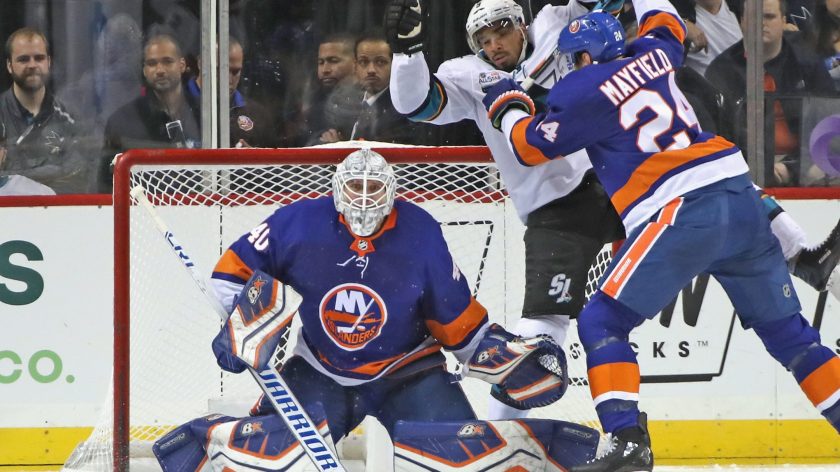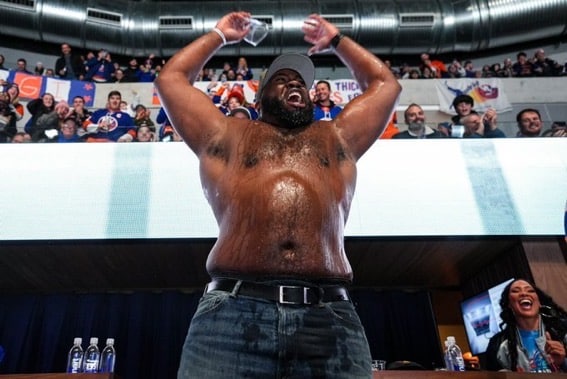New York Islanders have completed 180-degree turn from last season

Under the tutelage of Barry Trotz, the New York Islanders have completed a 180-degree turn from last season.
[sc name=”Justin Weiss Banner”]In 1998, Barry Trotz was in his first year as head coach of the Nashville Predators when he had an epiphany.
At the outset of the season, Trotz gained a reputation for being a no-nonsense tough guy who would snap at his players when things weren’t going well.
That season, things rarely went well for the expansion Predators.
Quickly, Trotz came to understand that this method did less to encourage better play as it did demoralize his troops.
So, Trotz decided to change his ways, adopting a style that he says mirrors that of a business leader: “Players are owners in the clubs now … and my job is to get these 23 or 24 individual businesses to work together,” Trotz told The Globe and Mail’s Eric Duhatschek in 2012.
Throughout a successful 20-year career as head coach of the Predators, Washington Capitals and New York Islanders, Trotz adapted to the needs of his players and became one of the most respected bench bosses in the league. When he finally won a Stanley Cup in 2017, he was hailed by the media for his team’s structured play — his five-man structure and four-line mentality.
But the difference in structure between coach to coach isn’t as much as people think.
What makes Trotz unique is that he gives his players ownership: “It’s about getting people to buy into what you’re doing as a group,” he told Duhatschek. “I have one simple rule. ‘I want you to get better because that makes us better. I want you to have a good career. I want you to have an understanding of what your potential is.’”
For many guys who star under Trotz, this means learning to play a 200-foot game. Trotz constantly preaches being responsible in the defensive zone, and his emphasis on defense has been credited for his team’s success in this regard. Over his four years in Washington, Trotz’s teams consistently ranked among the league’s best in the major defensive metrics.
[sc name=”Islanders Center” ]Trotz isn’t the only coach to preach defensive hockey, but he does tout a counter-attack offense that is more focused with being clean in the defensive zone than blitzing the opponent with shots.
Perhaps this can explain why the Islanders have completed a full 180° turn from last season. In 2017-18, the Islanders scored 3.18 goals-per-game and allowed 3.57. In 2018-19, the Islanders are averaging 2.81 goals and 2.84 goals-against per game.
“They’re one of the better defensive teams in the league,” Colorado Avalanche center Nathan MacKinnon told Newsday’s Andrew Gross prior to the Islanders’ 4-1 win on Monday night.
“I think we’re playing a 200-foot game,” Trotz told Gross.
“One of the reasons is we’re making good decisions. A lot of times we give up shots is because we’re not making good decisions. When our exits are clean, fewer shots. When our decisions at the red line and the blue line under pressure are good decisions, you get fewer shots.”
On the contrary, the Islanders are scoring less than in previous seasons. The power play has been particularly inefficient — with a 14.4 percentage, it ranks 26th in the league.
For goaltender Thomas Greiss, this is a worthwhile tradeoff. Speaking to Gross, Greiss said, “It makes my life easier, it makes everybody’s life easier. For me, the reads are easier. For the guys, the reads are easier.
“Everybody knows what’s going on.”
[sc name=”Islanders Link Next” link=”https://elitesportsny.com/2018/12/15/new-york-islanders-injuries-have-given-josh-ho-sang-one-last-chance/” text=”Injuries Have Provided Josh Ho-Sang One Final Chance” ] [sc name=”Islanders Footer”]Justin Weiss is a staff editor at Elite Sports New York, where he covers the New York Islanders and Brooklyn Cyclones. In 2016, he received a Quill Award for Freelance Journalism. He has written for the Long Island Herald, FanSided and YardBarker.






